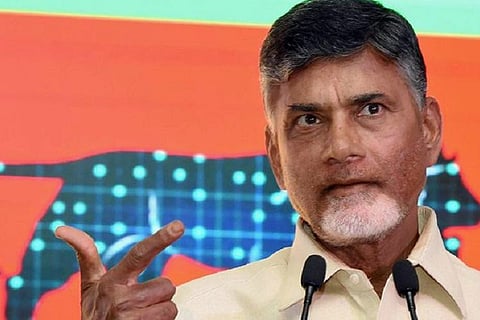

Last week, the news of the rape of a 9-year-old girl in AP’s Guntur district sent shock waves across the state and generated a prolonged public outcry. It also sparked debates over issues like death penalty for rapists, denial of legal aid to those involved in sexual assaults of minors and the poor conviction rate in rape cases.
The accused in the rape case was a 50-year-old rickshaw-puller and the victim happened to be a Muslim girl. The issue obviously took a communal colour, inviting political parties to indulge in some high drama to woo the Muslim minorities ahead of the elections.
YSRCP MLA and actor Roja exhibited her theatrical skills in full to demonise the TDP regime, holding it responsible for AP ranking third in gender crimes in the country. She was even quick to depict the rickshaw-puller accused in the rape case as a TDP card-holder. Promptly, the yellow brigades retaliated with personal allegations against Roja saying that she acted in porn films and that the porn content abundantly available on the internet is mainly responsible for the spurt in gender crimes.
Mob justice
The enraged mobs found remedy in street justice by attacking the house of the accused and assaulting his son in his absence. The rickshaw-puller, fearing public wrath, absconded after committing the alleged crime. Then the media trial began by running 24x7 live debates and updates on the crime, giving sleepless nights to the investigation agencies. Then came the news that the rape accused had committed suicide, leading to celebrations by certain sections. Images of the accused hanging from a tree were repeatedly telecast on TV channels. His family members suspected homicide, citing bruises on his body, but their concerns went unheard in the din.
Naidu’s statement
Later, the issue took a different dimension with Chief Minister N Chandrababu Naidu leading a public rally in Amaravati with twin demands – death penalty for rapists and denial of legal aid to the accused involved in sexual assaults on minor girls. Naidu, subsequently, became the target of civil rights groups and legal professionals for his controversial statement.
V Gurnadham, a senior advocate from Vijayawada, said denial of legal aid to the accused amounted to denial of the right to defend that is guaranteed to persons accused of crimes under Article 20 of the Constitution. VS Krishna, convener of the AP chapter of Human Rights Forum, attacked the CM for his utterances running counter to the international mood favouring abolition of capital punishment. It only intended to cover up the government’s failure to find a holistic approach to the problem by diverting public attention, he told TNM.
That’s why Naidu went on an overdrive to pre-empt the attempts of the opposition YSRCP to corner his government on gender crimes. This is apparent given the backdrop of the infamous rape cases of Kathua and Unnao that brought disrepute to the Modi-led NDA government.
Poor conviction rate
Ch D Tirumala Rao, Additional Director General of Police, Crime Investigation Department, in an official letter (dated April 13, 2018) to the Director General of Police M Malakondaiah, highlights the status of crimes against women and the poor conviction rate in AP in cases under the Protection of Children from Sexual Offences (POCSO) Act, 2012. According to the letter, 1,022 POCSO cases were registered in 2016 even as only 11 resulted in convictions. In the next year, 1,044 cases were booked under the same Act and just three persons were convicted.
Nimmaraju Ramamohan Rao of Help.org, which is working against child trafficking for sex work, said the low conviction rate is because of the ill-equipped prosecution and the failure to complete the trial within a stipulated timeline, giving ample scope for out-of-court settlements and intimidation of victims. When the guidelines envisage completion of trial of POCSO cases within four months from the occurrence of offences, it’s taking a few years in certain cases, he explained.
Public outrage
The spate of rape cases involving minor girls reported one after the other in Andhra Pradesh and Telangana, caused massive public outrage. Coincidentally, they all happened within a small timeframe. The sexual assault of a 13-year-old girl by her stepfather in Hyderabad shook the public conscience. In another case, two youths, including an undergraduate student, were arrested on charges of raping a 17-year-old girl in Kadapa district. Similar cases were reported in Tenali of Guntur district and Badvel of Kadapa district.
According to Dr Indla Ramasubba Reddy, a leading psychiatrist based in Vijayawada, official agencies, women’s groups and political parties are failing to get to the root of the problem. Reformation of persons involved in rape cases with psychosexual disorders, failed to find a mention in the official scheme of things, especially in cases of sexual assault of minor girls, he pointed out. Official measures reportedly end up trying to ensure punishment to the accused and payment of compensation to rape victims, which is not a lasting solution to the evil, Dr Reddy added.